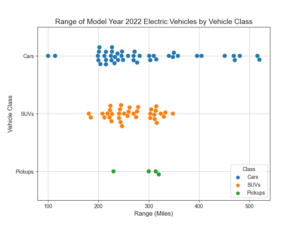For the 2022 model year, there was a more comprehensive range of EPA-estimated ranges for all-electric cars compared to electric SUVs and pickup trucks. All-electric cars had ranges that ranged from 100 to 520 miles, providing consumers with a variety of options to choose from based on their driving needs.
Electric SUVs
On the other hand, electric SUVs had a narrower range of available ranges, falling between 180 to 350 miles. This narrower band can be attributed to SUVs’ specific design and purpose, which often have larger bodies and may require more energy to operate. However, it’s important to note that these ranges are still quite impressive and can meet the needs of many drivers.
As for electric pickup trucks, limited models were available in 2022, resulting in a small range of available ranges. However, as more electric pickup truck models enter the market, the available ranges will likely expand.

The graph shows interesting pattern.
Evolving
The electric vehicle industry has been rapidly evolving, and automakers are investing heavily in developing electric pickup trucks due to their popularity and market demand. With advancements in battery technology and increased competition, we can expect to see a broader range of electric pickup truck models with varying ranges.
These ranges are EPA-estimated and can vary based on driving conditions, style, and other factors. Additionally, the information provided here is based on the knowledge available until September 2021, so there may have been new developments and releases in the electric vehicle market since then.
Pros of Electric Vehicles (EVs):
- Environmental Benefits: Electric vehicles produce zero tailpipe emissions, which helps reduce air pollution and greenhouse gas emissions. They contribute to cleaner air and can help mitigate climate change.
- Energy Efficiency: EVs are more energy-efficient than internal combustion engines (ICE) vehicles. They convert a higher percentage of energy from the grid to power at the wheels, resulting in less wasted energy.
- Lower Operating Costs: Electric vehicles have lower operating costs than traditional gasoline vehicles. Electricity is generally cheaper than gasoline, and EVs require less maintenance since they have fewer moving parts and don’t require oil changes.
- Renewable Energy Integration: EVs can be charged using electricity from renewable energy sources like solar and wind, further reducing dependence on fossil fuels and promoting the use of clean energy.
- Performance and Acceleration: Electric motors provide instant torque, delivering smooth and quick acceleration. Many electric vehicles offer excellent performance, including high speeds and impressive acceleration capabilities.
Cons of Electric Vehicles (EVs):
- Range Anxiety: One common concern with EVs is range anxiety, which refers to the fear of running out of battery power before reaching a charging station. Although the range of electric vehicles is improving, it can still be a limiting factor for long-distance travel, especially in areas with limited charging infrastructure.
- Charging Infrastructure: The availability of charging stations, especially fast-charging stations, can be limited in some areas. Expanding the charging infrastructure is essential to support the widespread adoption of electric vehicles.
- Charging Time: Charging an electric vehicle takes longer than refuelling a gasoline vehicle. Even with fast-charging stations, it can still take a significant amount of time to charge an EV fully.
- Upfront Cost: Electric vehicles generally have a higher upfront cost than traditional gasoline vehicles. Although prices have been decreasing, the initial purchase price of an EV can still be a barrier for some consumers. However, it’s worth noting that lower operating costs and potential incentives can help offset this higher upfront cost over time.
- Limited Model Availability: While the electric vehicle market is expanding, the availability of certain EV models, including electric SUVs and pickup trucks, may still be limited compared to traditional options. However, this will likely improve as automakers introduce more electric vehicle models in response to growing demand.
Conclusion
Electric vehicles (EVs) offer several advantages, such as environmental benefits, energy efficiency, lower operating costs, and the ability to integrate with renewable energy sources. They also provide excellent performance and acceleration due to their electric motors. However, some challenges include range anxiety, limited charging infrastructure, longer charging times, higher upfront costs, and limited model availability in specific vehicle categories.
Challenges
Despite these challenges, the electric vehicle market is rapidly evolving, and automakers are investing in the development of EVs to meet consumer demand and address these limitations. Advancements in battery technology and expanding charging infrastructure are helping to alleviate range anxiety and reduce charging times. Additionally, ongoing efforts to decrease the upfront cost of EVs through incentives and economies of scale make them more accessible to a broader range of consumers.
Overall, the pros of electric vehicles, such as environmental sustainability and lower operating costs, outweigh the cons for many individuals who prioritize these factors. As technology advances and the market expands, electric vehicles are expected to play an increasingly significant role in the transportation sector, contributing to a cleaner and more sustainable future.
Fueleconomy , Energy and Insideevs
































